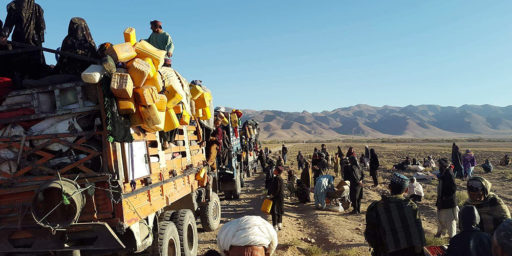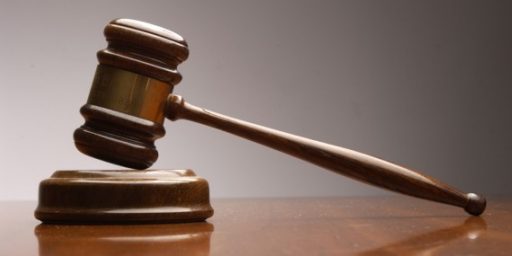American Muslim Convicted of Urging Holy War on U.S.
Scholar convicted of urging holy war on U.S. (AP)
An Islamic scholar who prosecutors said enjoyed “rock star†status among a group of young Muslim men in Virginia was convicted Tuesday of exhorting his followers in the days after Sept. 11 to join the Taliban and fight U.S. troops. The convictions against Ali al-Timimi, 41, carry a mandatory minimum sentence of life in prison without parole. But the judge left open the possibility that she will toss out some of the counts. The jury reached its verdict after seven days of deliberations and convicted al-Timimi of all 10 counts
Prosecutors said the defendant — a native U.S. citizen who has an international following in some Muslim circles — wielded enormous influence among a group of young Muslim men in northern Virginia who played paintball games in 2000 and 2001 as a means of training for holy war around the globe. Five days after Sept. 11, al-Timimi addressed a small group of his followers in a secret meeting and warned that the attacks were a harbinger of a final apocalyptic battle between Muslims and non-believers. He said they were required as Muslims to defend the Taliban from a looming U.S. invasion, according to the government.
While nobody ever joined the Taliban, four of the defendant̢۪s followers subsequently traveled to Pakistan in late September 2001 and trained with a militant group called Lashkar-e-Taiba. Three of them testified that their intention had been to use the training they received from the group to join the Taliban and fight in Afghanistan, and that it was al-Timimi̢۪s speech that inspired them to do so.
Incredible. While I’m incredibly reluctant to apply the label “treason,” insisting on the narrow definition specified in the Constitution, this would seem to qualify.
Article III, Section 3, Clause 1: Treason against the United States, shall consist only in levying War against them, or in adhering to their Enemies, giving them Aid and Comfort. No Person shall be convicted of Treason unless on the Testimony of two Witnesses to the same overt Act, or on Confession in open Court.
The Taliban was clearly the enemy of the United States at the time in question.






You might want to check the post—there appear to be some typos.
I can see this post without password protection now. Am I accidentally hacking your blog?
The Taliban was clearly the enemy of the United States at the time in question.
A bit to my surprise, I disagree with you:
Five days after Sept. 11, al-Timimi addressed a small group of his followers in a secret meeting and warned that the attacks were a harbinger of a final apocalyptic battle between Muslims and non-believers. He said they were required as Muslims to defend the Taliban from a looming U.S. invasion, according to the government.
Actually, at that time, we’d issued a demand to the Taliban to hand over OBL and his accomplices, which it’s entirely conceivable that the Taliban might’ve complied with. In which case they’d quite possibly still be in power, a la Pakistan.
See this timeline (no personal knowledge as to its accuracy):
Sept. 16: President Bush pledges “crusade” to “rid the world of evil-doers,” brushes off
reported Osama bin Laden denial. U.S. Vice President Dick Cheney warns that those who harbor
terrorists face “the full wrath of the United States.” Pakistani official says senior delegation sent
to Afghanistan to deliver U.S. message: hand over Osama bin Laden or risk massive assault.
* * *
Sept. 21: Taliban rulers refuse to hand over bin Laden and warn that any U.S. attacks could
plunge region into crisis.
On the facts as you report them, I’m curious whether a treason conviction can hold up; not that I’m a legal expert on treason or the definition of “enemy.”
Difficult to prove, possibly. Still, even according to the story, he was ordering them there to fight the U.S. forces about to invade.
Brian: Nah, just a stray letter in the password box that I accidentally typed.
Still, even according to the story, he was ordering them there to fight the U.S. forces about to invade.
If I exhort people to go to Sweden to fight against U.S. troops which might conceivably invade, have I committed treason?
I hope his lawyers are good enough to yield us an interesting circuit court opinion on appeal, whatever the outcome.
If the government of Sweden is actively working with–to the point of being virtually indistinct from–a terrorist group that has declared war on the United States and just murdered thousands of our citizens, I’d say yes. A U.S. invasion of Aghanistan was well beyond the theoretical at this point in time.
Send the creep to Eygpt…he’ll confess in open court!
If the remarks were made, say Sept 1, 2001 would they still be “treason?” I’m also curious, have there been any sucessful prosecutions of treason absent a declaration of War from Congress?
These extremists are determined to destroy the western world’s way of life and they are using religion as a vehicle. Very smart Idea, if we allow them to do it. There’r making headway.
I’m also curious, have there been any sucessful prosecutions of treason absent a declaration of War from Congress?
Were the Rosenbergs executed for treason? or espionage? —Oh, wait, Google exists. Espionage.
Given the rather poisonous political environment today, we have reason to be grateful for the Founders’ strict construction of “treason,” and I wouldn’t go around widening it, or else Ann Coulter’s definition may end up controlling.
N.b. that, despite our discussion based on JJ’s citation to the Constitution, the article doesn’t actually say “treason.”
Wikipedia has a good background discussion of the history of the application of the treason clause:
From Wikipedia:
The United States
To avoid the abuses of the English law, treason was specifically defined in the United States Constitution. Article Three defines treason as only levying war against the United States or “in adhering to their Enemies, giving them Aid and Comfort,” and requires the testimony of two witnesses to the same overt act or a confession in open court for conviction. This safeguard may not be foolproof since Congress could pass a statute creating treason-like offences with different names (such as sedition, bearing arms against the state, etc.) which do not require the testimony of two witnesses, and have a much wider definition than Article Three treason. For example, some well-known spies have generally been convicted of espionage rather than treason. In the United States Code the penalty ranges from “shall suffer death” to “shall be imprisoned not less than five years and fined under this title but not less than $10,000; and shall be incapable of holding any office under the United States.”
In the history of the United States there have been fewer than forty federal prosecutions for treason and even fewer convictions. Several men were convicted of treason in connection with the 1794 Whiskey Rebellion but were pardoned by George Washington. The most famous treason trial, that of Aaron Burr in 1807, resulted in acquittal. Politically motivated attempts to convict opponents of the Jeffersonian Embargo Acts and the Fugitive Slave Law of 1850 all failed. Significantly, after the American Civil War, no person involved with the Confederate States of America was charged with treason, and only one major Confederate official, the commandant of the Andersonville prison, who was charged with war crimes, was charged with anything at all.
Several people generally thought of as traitors in the United States, such as the Walker Family, or Julius and Ethel Rosenberg, were not prosecuted for treason per se, but rather for espionage.
Treason has become largely a wartime phenomenon in the 20th century, and the treason cases of World Wars One and Two were of minor significance. Most states have provisions in their constitutions or statutes similar to those in the U.S. Constitution. There have been only two successful prosecutions for treason on the state level, that of Thomas Dorr in Rhode Island and that of John Brown in Virginia.
In 1964, an author named John A. Stormer wrote a book considered a backstairs political classic and titled it None Dare Call It Treason—the book unexpectedly sold seven million copies with little or no advertising. It was revised and reissued by the original author in 1990. The title phrase has been reused and paraphrased many times in the ensuing forty years, and has become part of popular culture.
Just to add that, contrary to the impression given by Wikipedia, Stormer didn’t coin the “phrase”:
Treason doth never prosper–what’s the reason?
For, if it prosper, none dare call it treason.
—Sir John Harrington